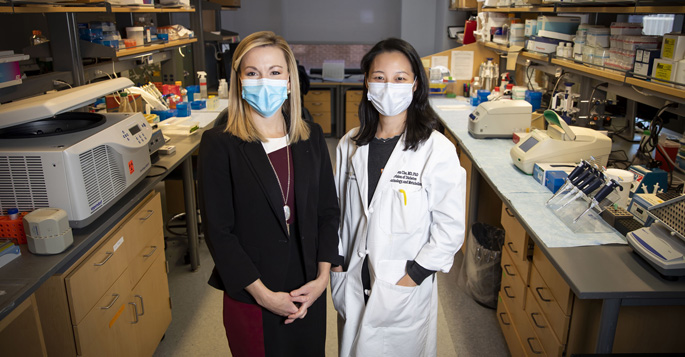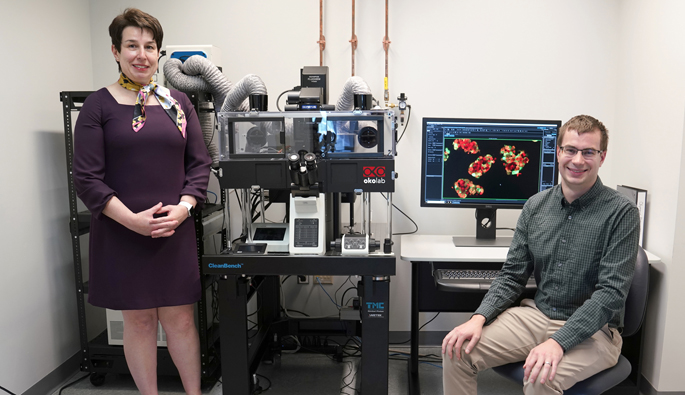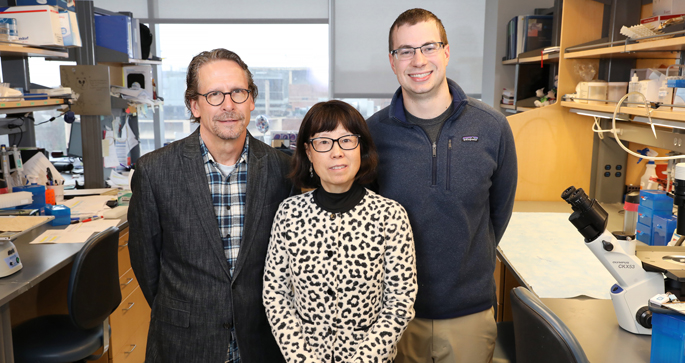DRTC Featured Press
Glucagon-blocking Antibodies Restore β-cells in Diabetes Model

Glucagon antagonist promotes β-cell survival, supports new direction in basic research. Danielle Dean, PhD is an author of this study.
Experts test intervention to improve sleep habits in pediatric patients with T1D

A consistent sleep schedule and regular number of hours may be more valuable than total sleep duration for managing type 1 diabetes (T1D) in pediatric patients, according to research published in Pediatric Diabetes. Sarah Jaser, PhD is the author of the recent study.
Nationwide network to expand understanding beyond T1D and T2D

RADIANT centers around a study designed to build a database of clinical, genetic, metabolomic and laboratory data from people with rare and atypical diabetes. The data will fuel research into both diagnostics and targeted therapeutics. Vanderbilt's Andrea Ramirez, MD is one of the principal investigators.
Diabetes Day focuses on diversity, inclusion in research
The event’s organizers also used the opportunity to examine the impact of race throughout history on the treatment of individuals with diabetes as well as the vital need to address diversity and inclusion in diabetes research and clinical care, and highlighted diabetes-related research at Vanderbilt, including that of trainees and young investigators. It featured a plenary presentation by Korey Hood, PhD, from Stanford University, and presentations by Vanderbilt faculty Rosette Chakkalakal, MD, MHS, Sheila Collins, PhD, and Richard Simerly, PhD.
A cohort for type 2 diabetes studies

Katherine N. Bachmann, MD, MSCI, and colleagues examined the National Patient-Centered Clinical Research Network (PCORnet) as a resource for studies of patients with type 2 diabetes. PCORnet is a national, distributed research network of interconnected health care data systems.
A 12-month campaign successfully engages at-risk patient groups


An automated text messaging program delivering friendly reminders and health advice for patients with type 2 diabetes (T2D) sustained a high level of patient engagement over a 12-month period, and it did so among diverse patients who have not typically been well represented in studies of its type. The research, published in Diabetes Care, was conducted by a Vanderbilt University Medical Center team that included Lyndsay Nelson, Ph.D., a research assistant professor of medicine, and Lindsay Mayberry, Ph.D., an assistant professor of medicine.
Researchers urge priority vaccination for individuals with diabetes due to increased COVID-19 impact
Vanderbilt University Medical Center researchers have discovered individuals with type 1 and type 2 diabetes infected with COVID-19 are three times more likely to have a severe illness or require hospitalization compared with people without diabetes.
Findings could elevate vaccine prioritization for type 1 patients

Type 1 (T1D) and type 2 (T2D) diabetes patients experience about the same increases in risk for developing more severe illness and for being hospitalized if they develop COVID-19. This is the finding of a new study led by Vanderbilt University Medical Center published in Diabetes Care. Previous studies of COVID-19 risk and diabetes have not thoroughly considered patients with T1D, says Justin Gregory, M.D., a pediatric endocrinologist at Monroe Carell Jr. Children’s Hospital at Vanderbilt and lead author of the paper.
Pancreatlas provides access to complex images of the human pancreas
Storing, sharing, and cataloguing these complex images is challenging, especially when sharing with other scientists or in publications. To address this, a Vanderbilt multidisciplinary team studying the human pancreas and its role in diabetes created a new approach for sharing such images.
Study sheds light on diabetes and COVID interaction

Katie Coate, PhD, left, Jeeyeon Cha, MD, PhD, and colleagues are working to understand the interaction of diabetes and COVID-19.
Brissova and colleagues sought a system that would enable them to genetically manipulate specific cells within islets and analyze the results

New R01's awarded to Dr. Ray Blind
Congrats to Dr. Blind on his two recently funded R01 awards on gene expression and structural biology.
Pseudoislet system expected to advance pancreas and diabetes research

Marcela Brissova, PhD, and MD/PhD student John “Jack” Walker are part of the research team that developed a pseudoislet system for integrated studies of human islet function. (photo by Donn Jones)
Keeping beta cells “fit”
Guoqiang Gu, PhD, and colleagues have assessed the roles of Sin3a/b in the embryonic development and postnatal function of pancreatic insulin-secreting beta cells.
Decreased pancreatic acinar cell number in type 1 diabetes


Congratulations to Jordan Wright from the Powers lab on the publication of his work on T1D featured in the "Up front" section of Diabetologia. The cover of the July issue also features a graphic from his research. The article is available to read from Springer using the link below.
Pancreatic islet cells distinct in mice and humans
Researchers in the lab of Roland Stein (Molecular Physiology & Biophysics), along with collaborators at UCSF, NC State, and UPenn, have shown distinct changes in human pancreatic islet cells throughout the course of life and the progression of type 2 diabetes. They also discovered distinct phenotypes in human islet cells compared to a mouse model.
Post-transplant diabetes may be reversible

Post-transplantation diabetes mellitus (PTDM), a common complication of immunosuppressive drugs that are given to prevent transplant rejection, may be reversible and at least partially preventable, researchers at Vanderbilt University Medical Center report.